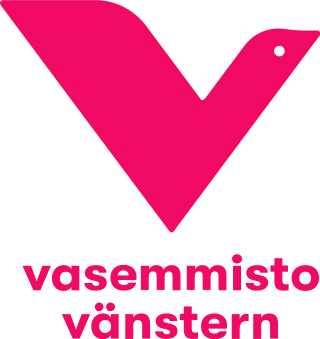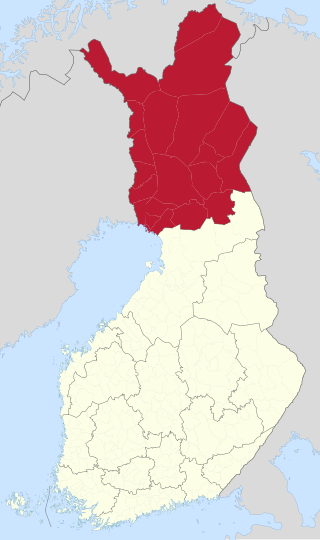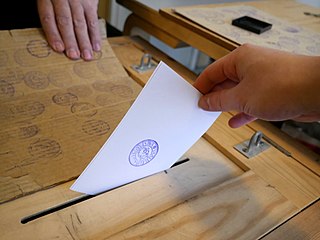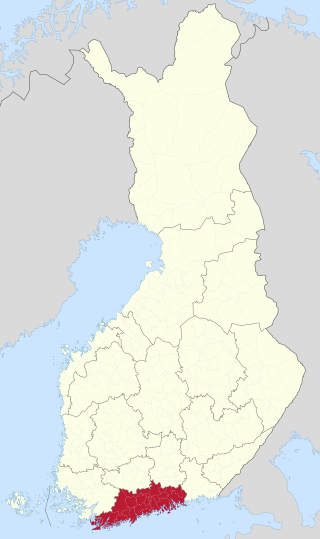
Finland, officially the Republic of Finland, is a Nordic country in Northern Europe. It borders Sweden to the northwest, Norway to the north, and Russia to the east, with the Gulf of Bothnia to the west and the Gulf of Finland to the south, opposite Estonia. Finland covers an area of 338,145 square kilometres (130,559 sq mi) and has a population of 5.6 million. Helsinki is the capital and largest city. The vast majority of the population are ethnic Finns. The official languages are Finnish and Swedish, of which 84.9 percent and 5.1 percent of the population speak the first as their mother tongue. Finland's climate varies from humid continental in the south to boreal in the north. The land cover is predominantly boreal forest biome, with more than 180,000 recorded lakes.
The Green League, shortened to the Greens, is a green political party in Finland. Ideologically, the Green League is positioned on the centre-left of the political spectrum. It is a reformist party and it is supportive of feminism, animal rights and green liberal ideas.

The Parliament of Finland is the unicameral and supreme legislature of Finland, founded on 9 May 1906. In accordance with the Constitution of Finland, sovereignty belongs to the people, and that power is vested in the Parliament. The Parliament consists of 200 members, 199 of whom are elected every four years from 13 multi-member districts electing 6 to 37 members using the proportional D'Hondt method. In addition, there is one member from Åland.
The Swedish People's Party of Finland is a Finnish political party founded in 1906. Its primary aim is to represent the interests of the minority Swedish-speaking population of Finland. The party is currently a participant in the Government of Petteri Orpo, holding the posts of Minister of Education, Minister for European Affairs, and Minister of Youth, Sport and Physical Activity.
The National Coalition Party is a liberal-conservative political party in Finland. It is currently the biggest party and the ruling political party of Finland.

The Left Alliance is a socialist political party in Finland.

The Christian Democrats is a Christian-democratic political party in Finland.

The prime minister of Finland is the leader of the Finnish Government. The prime minister and their cabinet exercise executive authority in the state. The prime minister is formally ranked third in the protocol after the president of Finland and the speaker of the Parliament. Finland's first prime minister, Pehr Evind Svinhufvud, was appointed on 27 November 1917, just a few days before the country declared its independence.

The Centre Party, officially the Centre Party of Finland, is an agrarian-centrist political party in Finland. Ideologically, the Centre Party is positioned in the centre on the political spectrum. It has been described as liberal, social-liberal, liberal-conservative, and conservative-liberal. The party’s leader is Annika Saarikko, who was elected in September 2020 to follow Katri Kulmuni, the former finance minister of Finland. As of December 2019, the party has been a coalition partner in the Marin Cabinet, led by Prime Minister Sanna Marin of the Social Democratic Party (SDP).

The Finns Party, formerly known as the True Finns, is a right-wing populist political party in Finland. It was founded in 1995 following the dissolution of the Finnish Rural Party. The party is currently a participant in the Government of Petteri Orpo, holding seven ministerial portfolios. The party achieved its electoral breakthrough in the 2011 Finnish parliamentary election, when it won 19.1% of votes, becoming the third largest party in the Parliament of Finland. In the 2015 election the party got 17.7% of the votes, making it the parliament's second-largest political party. The party was in opposition for the first 20 years of its existence. In 2015, it joined the coalition government formed by Prime Minister Juha Sipilä. Following a 2017 split, over half of the party's MPs left the parliamentary group and were subsequently expelled from their party membership. This defector group, Blue Reform, continued to support the government coalition, while the Finns Party went into opposition. The party, having been reduced to 17 seats after the split, increased its representation to 39 seats in the 2019 Finnish parliamentary election, while Blue Reform failed to win any seats. During the 2023 Finnish parliamentary election, the Finns Party finished in second place with 46 seats, recording their strongest result since its founding. They then, out of Petteri Orpo’s request, proceeded to form a coalition government with the winning National Coalition Party, the Christian Democrats and Swedish People's Party of Finland.

Lapland is the largest and northernmost region of Finland. The 21 municipalities in the region cooperate in a Regional Council. Lapland borders the region of North Ostrobothnia in the south. It also borders the Gulf of Bothnia, Norrbotten County in Sweden, Finnmark County and Troms County in Norway, and Murmansk Oblast and the Republic of Karelia in Russia. Topography varies from vast mires and forests of the South to fells in the North. The Arctic Circle crosses Lapland, so polar phenomena such as the midnight sun and polar night can be viewed in Lapland.

There are four types of elections in Finland. Each Finnish citizen at least 18 years of age has the right to vote in each of the elections, which decide the following: the president, the parliament, the MEPs, and the municipal and city councils.

Southwest Finland, calqued as Finland Proper, is a region in the southwest of Finland. It borders the regions of Satakunta, Pirkanmaa, Tavastia Proper (Kanta-Häme), Uusimaa, and Åland. The region's capital and most populous city is Turku, which was the capital city of Finland before Helsinki.

Uusimaa is a region of Finland. It borders the regions of Southwest Finland, Tavastia Proper (Kanta-Häme), Päijänne Tavastia (Päijät-Häme), and Kymenlaakso. Finland's capital and largest city, Helsinki, along with the surrounding metropolitan area, are both contained in the region, and Uusimaa is Finland's most populous region. The population of Uusimaa is 1,734,000.

The Finnish Government is the executive branch and cabinet of Finland, which directs the politics of Finland and is the main source of legislation proposed to the Parliament. The Government has collective ministerial responsibility and represents Finland in the Council of the European Union. In the incumbent Orpo Cabinet, the Government comprises 19 ministers leading 12 ministries.

The Social Democratic Party of Finland is a social democratic and pro-European political party in Finland. It is the third largest party in the Parliament of Finland with 43 seats. Founded in 1899 as the Workers' Party of Finland, the SDP is Finland's oldest active political party and has a close relationship with the Central Organisation of Finnish Trade Unions. It is also a member of the Party of European Socialists, Progressive Alliance, Socialist International and SAMAK.

Sanna Mirella Marin is a Finnish former politician who served as prime minister of Finland from 2019 to 2023 and as the leader of the Social Democratic Party of Finland (SDP) from 2020 to 2023. She was a Member of Parliament from 2015 to 2023. She was re-elected as member of parliament in April 2023 but resigned from her position in the Finnish parliament to become a strategic adviser on political leaders' reform programmes in the Tony Blair Institute in September 2023.
The National Socialist Union of Finland, later the Finnish-Socialist Party was a Finnish Nazi political party active in the 1930s, whose driving force and ideologue was Professor Yrjö Ruutu. With an ideology based on Ruutu's theories, the party came to reject orthodox German Nazism.













